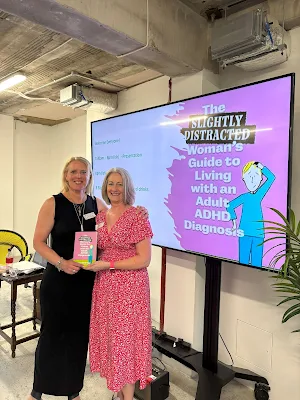The Slightly Distracted Woman's Guide to Living with an Adult ADHD Diagnosis is the latest book from Laura Kerbey, following her first offering The Educator's Experience of Pathological Demand Avoidance, and her more recent publication The Teen’s Guide to PDA.
Laura begins the book by explaining how she received her ADHD diagnosis at the grand age of 46. What follows is a refreshing blend of lived experience, relevant research, and everyday strategies, with charming illustrations by Eliza Fricker and candid quotes from other ADHD women worldwide. This isn’t a manual; it’s an honest, thoughtful guide that hints at the messiness, beauty and chaos of ADHD life, particularly for women who often feel unseen.
Imagine sitting down with a wise friend - someone who doesn’t sugarcoat the realities, yet never fails to offer a glimmer of hope when adult-ADHD life feels like walking on eggshells. This is the guiding tone set in this book from page one: honest, informal, validating, and gently humorous.
The book is divided into eleven short, punchy, topic-focused chapters: childhood and education, parenting, ADHD hormones and menopause, rejection-sensitive dysphoria and imposter syndrome, work and career, mental health, friendships and relationships, impulsivity and impatience, special interests, onsessions and random collections, shopping (and other addictions) and dropping the disorder and reframing ADHD. Personal stories are intertwined with research and reflections, and Laura's insights are helpfully accompanied by suggestions of ways to help.
Post-natal depression is mentioned in the parenting chapter as Laura talks about the enormous pressure and anxiety around being a new mum. Parenting tips include the suggestion of challenging your thinking and focusing on what is going well rather than what doesn't. There's also a reminder that 'comparison is the thief of joy' - it's best not to compare yourself to others, there really is no such thing as a perfect parent.
Few ADHD books talk about adult hormones and the menopause transition. Laura dedicates a chapter to this, with research and lived stories about shifting attentional needs and fluctuating mood. PMDD (Prementrual Dysphoric Disorder) is also mentioned. There's brief talk about medication in the mental health and hormones/menopause chapters, with a nod to the knowledge that what helps will be difefrent for everyone.
One of the most powerful chapters tackles RSD (Rejection-Sensitive Dysphoria) - a phenomenon many women face without knowing the name. Laura writes that some studies report that 98% of ADHD individuals experience it. Quotes are shared that echo Laura's sentiment of being a people pleaser, and a catastrophizer. The second half of this chapter looks at how Imposter Syndrome is similar and is often interlinked with RSD. Those experiencing this can feel like a fraud and struggle to believe in themselves. Laura writes about how evidence can help cancel out the doubts, and how she sees that the more she embraces her ADHD, the more authentic she becomes, and the more successful she then is.
Late diagnosis can feel terribly disruptive when you’ve built a life around expectations your brain wasn’t wired for. Laura discusses executive dysfunction, body doubling and monotropism. Interspersed are stories of women pivoting careers, negotiating hybrid workdays, or reshaping goals to match their brains. Some of Laura's words that I most related to were:
As I have already said, one of the biggest myths about ADHD is that it is an 'attention deficit' disorder. A lot of the time, I don't have a deficit of attention; I have too much attention, but I just can't apply evenly to tasks I need to work on.
Each chapter concludes with 'What else could help' and useful links where appropriate. There's also a blank, bordered page each time so that the reader could make their own notes and comments should they wish. The final chapter is overwhelmingly positive and includes a letter Laura has written to her younger self, and what she would change - not a lot, other than having the understanding about ADHD.
 |
| Introduction page, with illustrations of the words lazy, clumsy, stupid, forgetful, annoying, weird, a bit much, disorganised, oversensitive, walking disaster |
The Slightly Distracted Woman’s Guide to Living with an Adult ADHD Diagnosis is for anyone who has been diagnosed late in life with ADHD. It’s also for those who have been diagnosed as teenagers, or parents of children and young adults diagnosed with ADHD. If you’ve been called any of the names in the graphic above, it could be for you! Great for professionals, partners, family members, and friends seeking insight and affirmation. Available from all good bookshops and Amazon here: The Slightly Distracted Woman’s Guide to Living with an Adult ADHD Diagnosis.
(*Some of the underlined text and the pictures in this post are affiliate links; as an Amazon Associate I earn from qualifying purchases but it won't cost you any extra)























No comments:
Post a Comment
Comments are always very much appreciated and can really help the conversation go further...